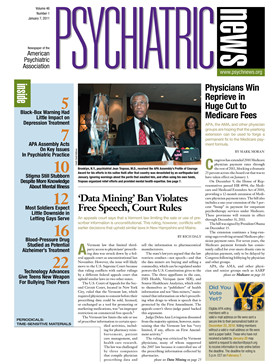A few months ago, Declan Murphy, M.D., a professor of psychiatry and brain maturation at the Institute of Psychiatry, King's College London, and colleagues reported a promising biological diagnostic test for autism.
It consists of reconstructing an MRI scan of a person's brain into a 3-D image so that a computer can examine the architecture of the brain and determine whether it is afflicted with signs pointing to the presence of autism (Psychiatric News, September 17, 2010).
Now another promising biological diagnostic test for autism has been developed. A relatively new MRI technique called diffusion tensor imaging is used to visualize and measure white-matter nerve fibers in two regions of the brain critical to language, emotion, and social cognition—the superior temporal lobe gyrus and the temporal lobe stem. Deficits in language, emotion, and social cognition are hallmarks of autism.
The lead investigator was Nicholas Lange, Sc.D., an associate professor of psychiatry at Harvard Medical School, and the senior investigator was Janet Lainhart, M.D., of the University of Utah. Results were published online November 29, 2010, in Autism Research.
The new biological test was evaluated on 60 male subjects aged 8 to 26. Half had previously met full criteria for autism using a standard subjective scoring system, which is based on assessing patients and questioning their parents about functionality in language, social functioning, and behavior. The other half constituted a control group of normally developing individuals.
Atypical deviations in white-matter nerve fibers in the superior temporal lobe gyrus and temporal lobe stem were found to discriminate individuals with autism from typically developing individuals with 94 percent sensitivity, 90 percent specificity, and 92 percent accuracy.
An equally high performance was seen in a small independent replication sample of 12 subjects with autism and nine matched controls studied by the same researchers.
“This is not yet ready for prime-time use in the clinic, but the findings are most promising,” Lange said in a prepared statement.
“Indeed, we have new ways to discover more about the biological basis of autism and how to improve the lives of individuals with the disorder,” Lainhart added in the same statement.
“This is a very interesting paper, which further demonstrates the potential utility of biomarkers in people with autism spectrum disorder—and including children,” Murphy told Psychiatric News.
“Additional studies are under way at present with much larger samples of individuals with autism, including high-severity autism, younger children, and females,” Lange told Psychiatric News. “Results should be available in about one or two years.”
The study was funded by the National Institutes of Health.
